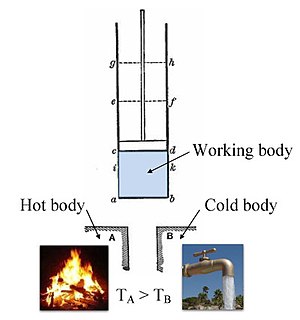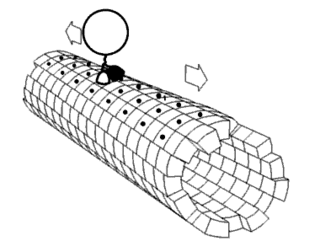Chemical thermodynamics is the study of the interrelation of heat and work with chemical reactions or with physical changes of state within the confines of the laws of thermodynamics. Chemical thermodynamics involves not only laboratory measurements of various thermodynamic properties, but also the application of mathematical methods to the study of chemical questions and the spontaneity of processes.
The following outline is provided as an overview of and topical guide to physics:

Thermodynamics is a branch of physics that deals with heat, work, and temperature, and their relation to energy, entropy, and the physical properties of matter and radiation. The behavior of these quantities is governed by the four laws of thermodynamics which convey a quantitative description using measurable macroscopic physical quantities, but may be explained in terms of microscopic constituents by statistical mechanics. Thermodynamics applies to a wide variety of topics in science and engineering, especially physical chemistry, biochemistry, chemical engineering and mechanical engineering, but also in other complex fields such as meteorology.

Josiah Willard Gibbs was an American scientist who made significant theoretical contributions to physics, chemistry, and mathematics. His work on the applications of thermodynamics was instrumental in transforming physical chemistry into a rigorous inductive science. Together with James Clerk Maxwell and Ludwig Boltzmann, he created statistical mechanics, explaining the laws of thermodynamics as consequences of the statistical properties of ensembles of the possible states of a physical system composed of many particles. Gibbs also worked on the application of Maxwell's equations to problems in physical optics. As a mathematician, he invented modern vector calculus.

Biophysics is an interdisciplinary science that applies approaches and methods traditionally used in physics to study biological phenomena. Biophysics covers all scales of biological organization, from molecular to organismic and populations. Biophysical research shares significant overlap with biochemistry, molecular biology, physical chemistry, physiology, nanotechnology, bioengineering, computational biology, biomechanics, developmental biology and systems biology.

The Conference and Workshop on Neural Information Processing Systems is a machine learning and computational neuroscience conference held every December. The conference is currently a double-track meeting that includes invited talks as well as oral and poster presentations of refereed papers, followed by parallel-track workshops that up to 2013 were held at ski resorts.
Gary Keith Ackers was Emeritus Professor of Biochemistry and Molecular Biophysics of Washington University in St. Louis, Missouri.
The Philosophy of Science Association (PSA) is an international academic organization founded in 1933 that promotes research, teaching, and free discussion of issues in the philosophy of science from diverse standpoints. The PSA engages in activities such as the publishing of periodicals, essays and monographs in the field of the philosophy of science; holding biennial conferences; awarding of prizes for distinguished work in the field; supporting early-career scholars; and sponsoring in public engagement events.
Biological thermodynamics is the quantitative study of the energy transductions that occur in or between living organisms, structures, and cells and of the nature and function of the chemical processes underlying these transductions. Biological thermodynamics may address the question of whether the benefit associated with any particular phenotypic trait is worth the energy investment it requires.

The Biophysical Society is an international scientific society whose purpose is to lead the development and dissemination of knowledge in biophysics. Founded in 1958, the Society currently consists of over 7,500 members in academia, government, and industry. Although the Society is based in the United States, it is an international organization. Overseas members currently comprise over one third of the total.

A poster presentation, at a congress or conference with an academic or professional focus, is the presentation of research information in the form of a paper poster that conference participants may view. A poster session is an event at which many such posters are presented. Poster sessions are particularly prominent at scientific conferences such as medical and engineering congresses.

Intelligent Systems for Molecular Biology (ISMB) is an annual academic conference on the subjects of bioinformatics and computational biology organised by the International Society for Computational Biology (ISCB). The principal focus of the conference is on the development and application of advanced computational methods for biological problems. The conference has been held every year since 1993 and has grown to become one of the largest and most prestigious meetings in these fields, hosting over 2,000 delegates in 2004. From the first meeting, ISMB has been held in locations worldwide; since 2007, meetings have been located in Europe and North America in alternating years. Since 2004, European meetings have been held jointly with the European Conference on Computational Biology (ECCB).
The American Society of Hematology (ASH) is a professional organization representing hematologists. It was founded in 1958. Its annual meeting is held in December of every year and has attracted more than 30,000 attendees. The society publishes the medical journal Blood, the most cited peer-reviewed publication in the field, which is available weekly in print and online, as well as the newly launched, online, peer-reviewed open-access journal, Blood Advances.
The American Physiological Society is a non-profit professional society for physiologists. It has nearly 10,000 members, most of whom hold doctoral degrees in medicine, physiology or other health professions. Its mission is to support research and education in the physiological sciences. The society publishes 16 peer reviewed journals, sponsors scientific conferences, and sponsors awards to further this mission.
Timothy M. Lohman earned his Ph.D. in physical chemistry from the University of Wisconsin-Madison in 1977. After completing his Ph.D., he furthered his training with postdoctoral research at the University of California and the University of Oregon. He is currently a Professor in the Department of Biochemistry and Molecular Biophysics at the Washington University School of Medicine. He has been named to the position of Marvin A. Brennecke Professor of Biological Chemistry and in 2008 served as president of the Gibbs Society of Biological Thermodynamics. He will be giving the second annual Gary K. Ackers Lecture at the 24th annual meeting of the Gibbs Society of Biological Thermodynamics.
The British Biophysical Society is a scientific society that exists to encourage and disseminate developments in the application of physical and chemical concepts to biological systems. It was founded in 1960 following a report from a Working Party on Biophysics and Biophysical Chemistry initiated by the Council of the then Faraday Society of London.

The International Conference on Computational Intelligence Methods for Bioinformatics and Biostatistics (CIBB) is a yearly scientific conference focused on machine learning and computational intelligence applied to bioinformatics and biostatistics.
Neuronus IBRO & IRUN Neuroscience Forum is an annual conference organized at the Jagiellonian University in Kraków (Poland) for young researchers from diverse subdiscplines of neuroscience. Most of the topics cover neurobiology, cognitive and affective neuroscience, as well as clinical neuroscience and neurology.
The Association of Southeastern Biologists (ASB) is a scientific professional organization in the southeastern United States focused on promoting research and education across the biological sciences. The ASB hosts an annual meeting featuring paper and poster sessions, workshops, and symposia across a variety of biological disciplines. The ASB also issues the yearly publication Southeastern Biology.
The International Society of Arthroscopy, Knee Surgery and Orthopaedic Sports Medicine (ISAKOS) is an international medical society with around 4,000 members. The membership comprises mostly orthopaedic surgeons along with sports scientists, sports physicians and sports physical therapists. The members are from some 92 different countries and are members of their local orthopaedic sports medicine societies or similar associations. Members may also be associated with their global regional orthopaedic sports medicine society such as the Arthroscopy Association of North America, the American Orthopaedic Society for Sports Medicine (AOSSM), the Asia-Pacific Knee, Arthroscopy and Sports Medicine Society, the European Society for Sports Traumatology, Knee Surgery and Arthroscopy (ESSKA) and the Sociedad Latinoamericana de Artroscopia, Rodilla y Deporte (SLARD) in particular.